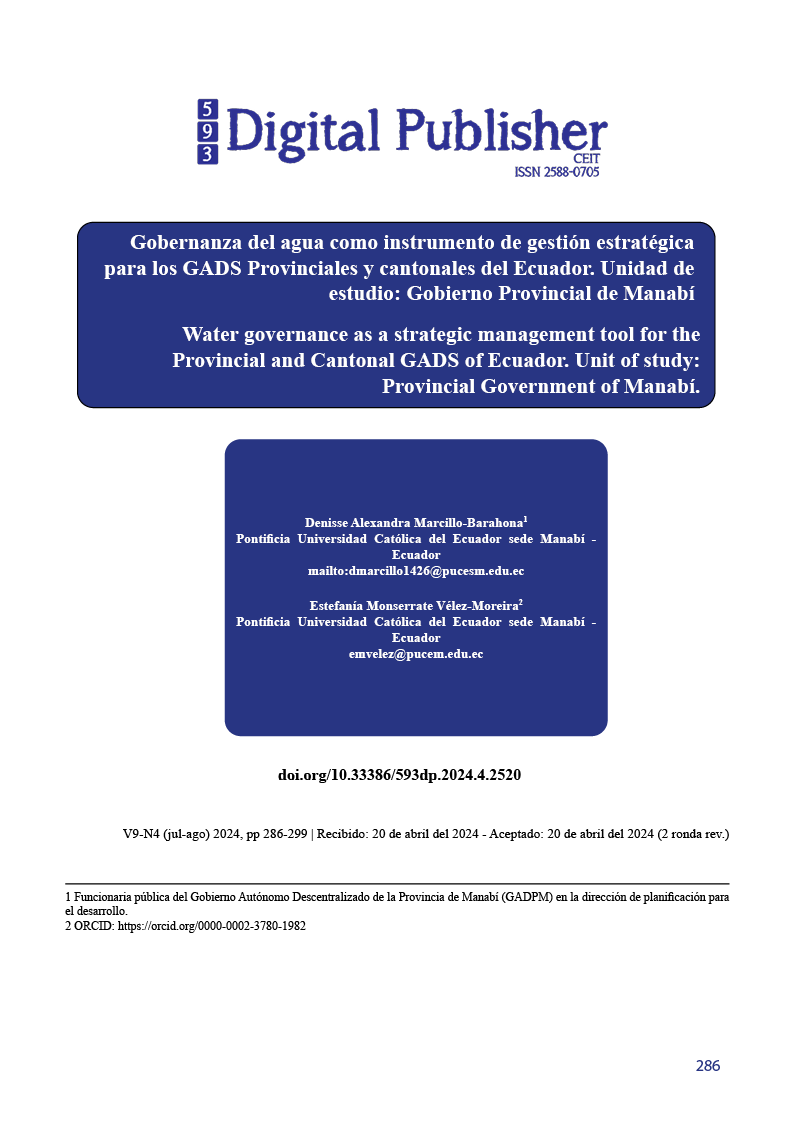Water governance as a strategic management tool for the Provincial and Cantonal GADS of Ecuador. Unit of study: Provincial Government of Manabí
Main Article Content
Abstract
This research work with a qualitative approach has as its main objective to analyze the Governance of the provincial water sector of Manabí and the different Cantonal Gad 2023-2024 with the purpose of understanding the correct management of the water resource and the powers established according to the current regulatory framework in the Code. Organization of Territorial Organization, Autonomy and Decentralization (COOTAD). To achieve this, this study adopts a descriptive analytical scope through the search for information, with techniques such as semi-structured interviews with groups of informants. In addition, the competencies will be reviewed in accordance with current regulations (COOTAD) related to the use of water resources of the Provincial Government of Manabí and the different Cantonal GADs, to then define the causes of the competencies related to the use of water resources by of the provincial government of Manabí and the different cantonal GADs, once analyzed and through the triangulation of information, the relationship between the powers of the current regulations (COOTAD) and the internal and external actors towards adequate governance management will be determined, with the above Exposed, the reasons why there is confusion of powers on the part of the Provincial Government of Manabí and the different cantonal GADs would be evident, considering that in many of the cantonal GADs they do not meet this need and the Provincial Government of Manabí is turned to without correct address, having as a premise that this is not the direct responsibility of the GPM but of the different cantonal GADs.
Downloads
Article Details

This work is licensed under a Creative Commons Attribution-NonCommercial-ShareAlike 4.0 International License.
1. Derechos de autor
Las obras que se publican en 593 Digital Publisher CEIT están sujetas a los siguientes términos:
1.1. 593 Digital Publisher CEIT, conserva los derechos patrimoniales (copyright) de las obras publicadas, favorece y permite la reutilización de las mismas bajo la licencia Licencia Creative Commons 4.0 de Reconocimiento-NoComercial-CompartirIgual 4.0, por lo cual se pueden copiar, usar, difundir, transmitir y exponer públicamente, siempre que:
1.1.a. Se cite la autoría y fuente original de su publicación (revista, editorial, URL).
1.1.b. No se usen para fines comerciales u onerosos.
1.1.c. Se mencione la existencia y especificaciones de esta licencia de uso.
References
Álvarez Enríquez, G. F., Delgado Arteaga, B. E., & Piñas Piñas, L. F. (2020). Turismo sostenible en el marco de los objetivos de la agenda 2030, en el cantón Baños de Agua Santa del Ecuador. Dilemas Contemporáneos: Educación, Política y Valores. https://doi.org/10.46377/dilemas.v8i1.2466
Aranda, M. F., & Bey, J. M. P. (2021). Metodología para la gestión integrada e inteligente de destinos turísticos de Manabí – Ecuador. International Journal of Professional Business Review. https://doi.org/10.26668/businessreview/2021.v6i1.208
Blandáriz, S. R., Véliz, R., & Ponce, D. V. C. (2020). Biodiversidad como indicador de sostenibilidad para la gestión Aranda, M. F., & Bey, J. M. P. (2022). Methodology for the integrated and intelligent management of tourist destinations in Manabí-Ecuador. Smart Tourism. https://doi.org/10.54517/st.v3i1.1723
Boisier, S. (2020). Desarrollo (local): ¿De qué estamos hablando? FLACSO Andes. www.flacsoandes.edu.ec/web/imagesFTP/1245948918.Desarrollo_Local_De_que_estamos_hablando__2_.pdf
Chávez, W. J. (2018). El derecho fundamental al agua dentro del marco del servicio público de agua potable en el Ecuador. Universidad Andina Simón Bolívar. repositorio.uasb.edu.ec/bitstream/10644/6190/1/T2619-MDE-Nu%C3%B1ez-El%20derecho.pdf
Couvreur, T., Cornejo, X., Zapata, J., & Loor, A. (2022). Two new magnoliid (Annonaceae, Lauraceae) tree species from Manabí, western Ecuador. Blumea - Biodiversity, Evolution and Biogeography of Plants. https://doi.org/10.3767/blumea.2022.67.02.02
De La Torre Mendoza, R. G., Intriago Loor, S. A., Zambrano Pinargote, C. L., & Cedeño Villón, Z. L. (2020). El consumo de sustancias psicotrópicas de los estudiantes del cantón Bolívar, Provincia de Manabí, en Ecuador. Sinapsis, 2(15), 10. https://doi.org/10.37117/s.v2i15.227
Delgado, V. M. R., Zambrano, G. V. R., Cossío, N. S., & Mera, L. B. (2020). Análisis de la cadena agroalimentaria del coco (cocos nucifera) en la provincia de Manabí, Ecuador. La Técnica: Revista de las Agrociencias. https://doi.org/10.33936/la_tecnica.v0i24.2345
Flor-Vélez, J. R., Montes-Escobar, K., Corzo-Bacallao, J., Garcés-Fiallos, F. R., & Salas-Macías, C. A. (2023). Exploring the relationship between tree diversity and carbon storage in aboveground biomass of coffee agroforestry systems in southern Manabí, Ecuador. Agroecology and Sustainable Food Systems, 48, 183-198. https://doi.org/10.1080/21683565.2023.2270449
Guanoluiza, M. L. (2022). La planificación participativa en la gestión del territorio, el caso de la Parroquia Malchinguí en Ecuador. Dialnet. dialnet.unirioja.es/servlet/articulo?codigo=8489025
Loaiza, F. R. (2022). El recurso hídrico y su relación con los conflictos sociambientales. XXIV Jornadas de Derecho y Gestión de Aguas Desafíos Hídricos para el Desarrollo Sostenible, Santiago de Chile. derechoygestionaguas.uc.cl/es/documentos/new/595-5-francisco-revilla/file
Martín, L. (2015). Análisis, prevención y resolución de conflictos por el agua en América Latina y el Caribe. Cepal. www.cepal.org/sites/default/files/events/files/analisis_prevencion_y_resolucion_de_conflictos_por_el_agua_en_america_latina_y_el_caribe_se_ruega_no_circular.pdf
Mendoza, B. (2023). 600.000 manabitas no tienen acceso asegurado al agua potable. Primicias. www.primicias.ec/noticias/sociedad/manabi-agua-potable-tuberia-distribucion/
Mera-Shiguango, A. P., Castro-Delgado, C. J., & Vega-Játiva, M. (2022). Role of ancestral knowledge in the development of agriculture in the south-central microregion of Manabí, Ecuador. International Journal of Social Sciences and Humanities. https://doi.org/10.53730/ijssh.v6n3.13706
Organización de las Naciones Unidas para la Alimentación y la Agricultura [FAO]. (2011). El estado de los recursos de tierras y aguas del mundo para la alimentación y la agricultura. FAO y Earthscan. fao.org/3/i1688s/i1688s.pdf
Organización para la Cooperación y el Desarrollo Económicos [OECD]. (2018). Marco de indicadores de gobernanza del agua de la OECD. Water Governance Indicator Framework.
Ortiz-Prado, E., Henríquez-Trujillo, A. R., Rivera-Olivero, I., Freire-Paspuel, B., Vallejo-Janeta, A. P., Lozada, T., & Garcia-Bereguiain, M. (2021). Massive SARS-CoV-2 RT-PCR testing on rural communities in Manabi Province (Ecuador) reveals severe COVID-19 outbreaks. The American Journal of Tropical Medicine and Hygiene, 104, 1493-1494. https://doi.org/10.4269/ajtmh.20-1208
Pérez, F. R., & Vina, M. (2021). From below and from within: Fishing communities under the COVID-19 pandemic and other globalizations in southern Manabí, Ecuador. Territory, Politics, Governance, 10, 917-936. https://doi.org/10.1080/21622671.2021.1960595
Porras, J. A. J., & Govea, A. A. R. (2020). Arqueo-turismo en Manabí: Activación turística del legado ancestral para el desarrollo local en la provincia de Manabí, Ecuador. https://doi.org/10.5281/zenodo.4065804
Rodriguez-Paredes, M. B., Vallejo-Janeta, P. A., Morales-Jadán, D., Freire-Paspuel, B., Ortiz-Prado, E., Henríquez-Trujillo, A. R., Rivera-Olivero, I., Jaramillo, T., Lozada, T., & Garcia-Bereguiain, M. (2021). COVID-19 community transmission and super spreaders in rural villages from Manabi province in the coastal region of Ecuador assessed by massive testing of community-dwelling population. The American Journal of Tropical Medicine and Hygiene, 106(1), 121-126. https://doi.org/10.4269/ajtmh.21-0582
Tognoli, J. (2019). Participación ciudadana en la gestión pública. CEPAL.
Unión Internacional para la Conservación de la Naturaleza [IUCN]. (2021). Un nuevo plan para recuperar la biodiversidad de agua dulce. www.iucn.org/es/news/america-del-sur/202003/un-nuevo-plan-para-recuperar-la-biodiversidad-de-agua-dulce
Vegas, O. (2021). La descentralización de los sistemas de abastecimiento de agua. Iagua. www.iagua.es/blogs/oscar-vegas-nino/descentralizacion-sistemas-abastecimiento-agua
Vera, R., ZambranoUreta, L. A., & Párraga, Y. (2023). Estrategias para la gestión del turismo rural en el sitio llamado Mosquito del cantón Chone, Ecuador. Universidad-Verdad. https://doi.org/10.33324/uv.v1i82.643
Zirufo-Briones, B. V., & Pelegrín-Entenza, N. (2023). Model for the strategic governance of the integrated and sustainable local development of the Portoviejo Canton in the province of Manabí, Ecuador. Sustainability. https://doi.org/10.3390/su151914136



